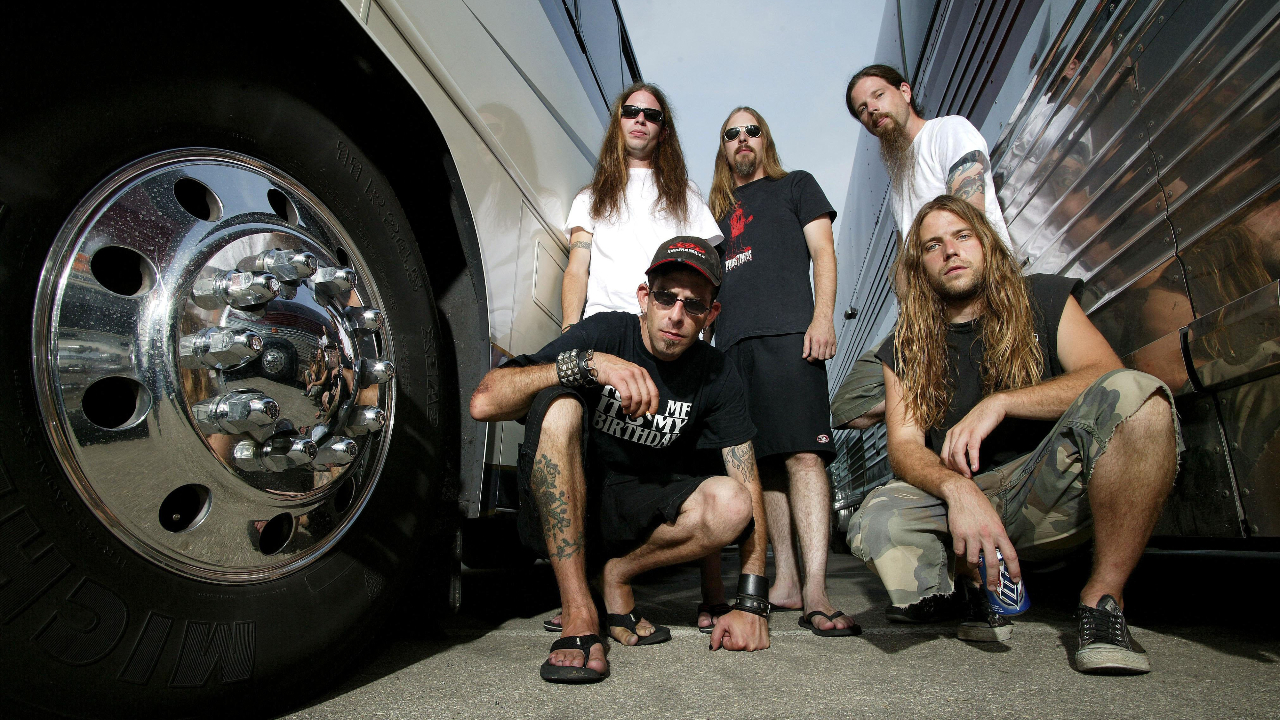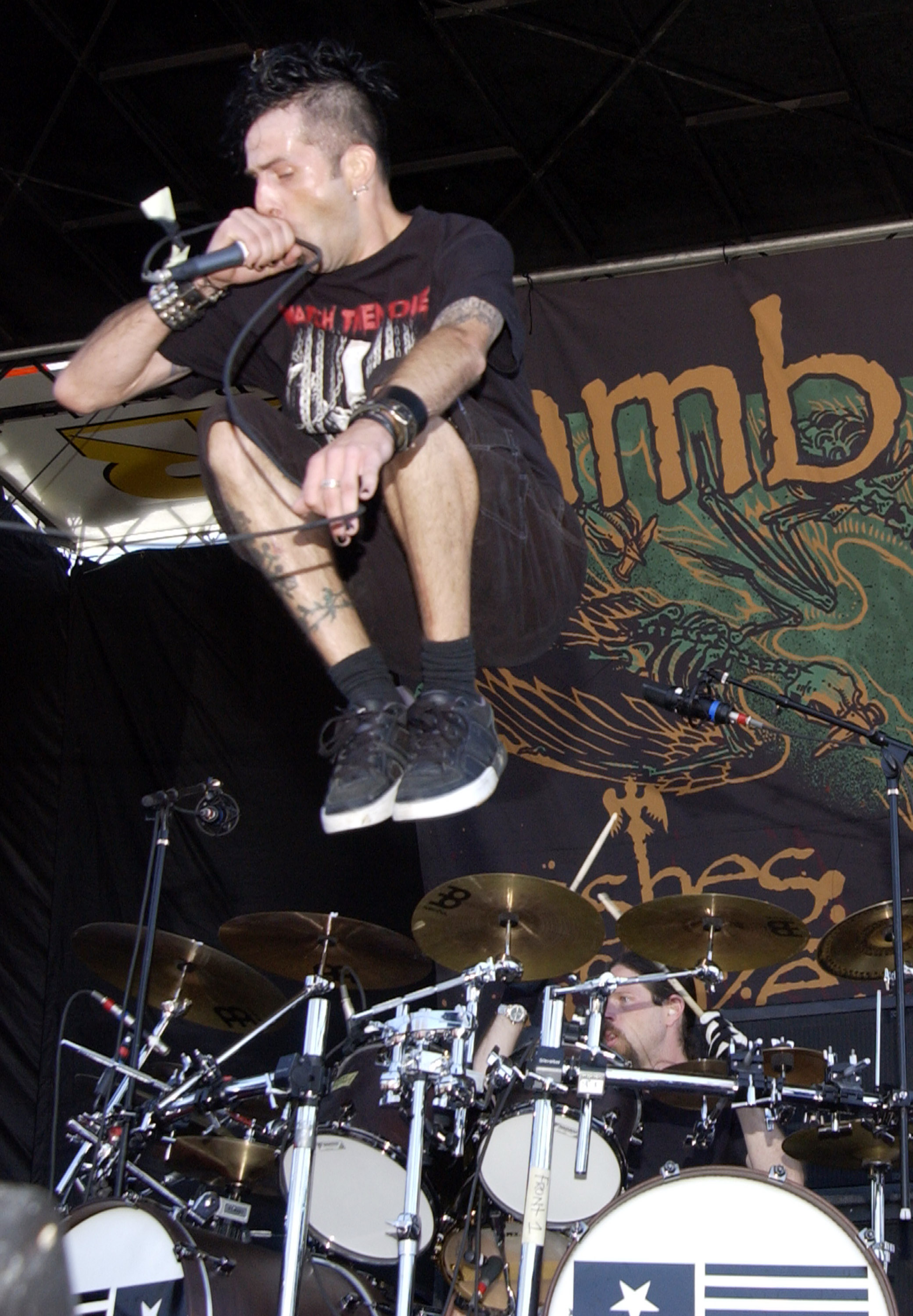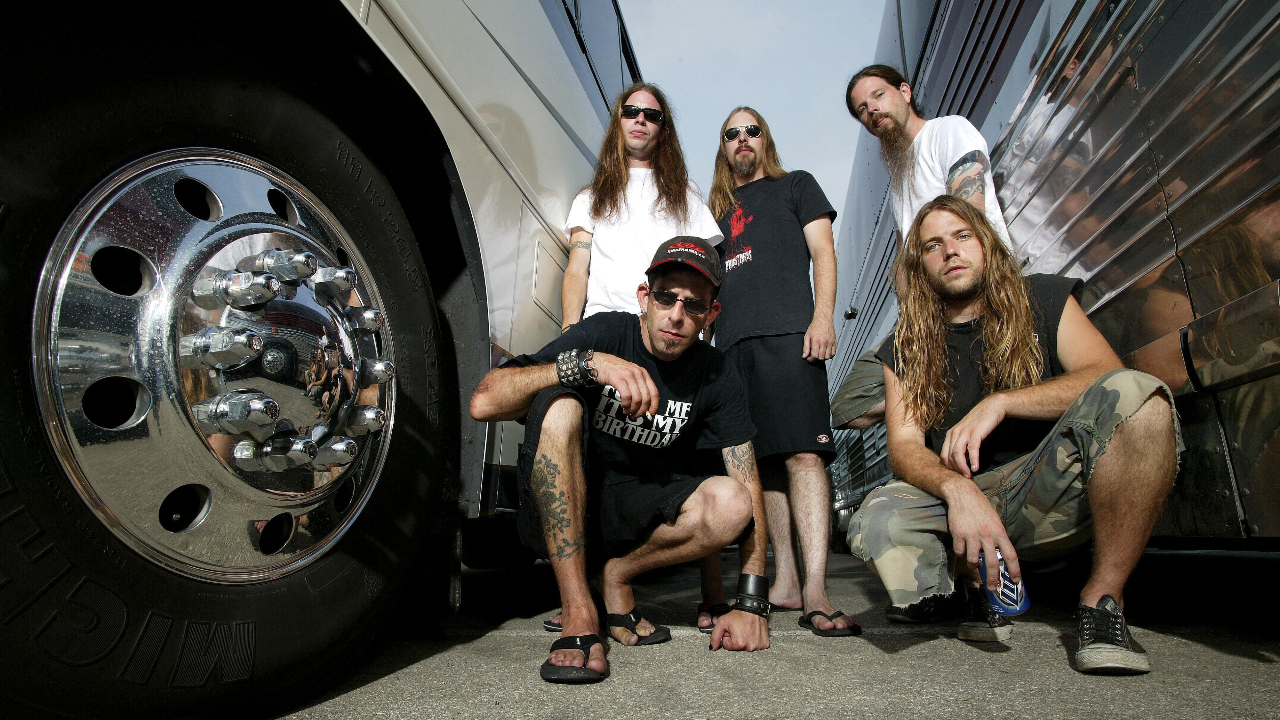
Randy Blythe was outside Philadelphia’s Electric Factory when he realised something was happening. It was November 1, 2003, and his band, Lamb Of God, were on the Headbangers Ball Tour alongside kindred spirits Killswitch Engage, Shadows Fall, Unearth and God Forbid.
“I remember very specifically sitting outside Killswitch Engage’s bus at the Electric Factory,” says Randy now. “I remember looking around and having this realisation: ‘This is a very special time. Something is happening right now. Pay attention.’” His instincts were correct. Musically, it was a time of upheaval. Lamb Of God had released their third album, As The Palaces Burn, six months earlier to great acclaim. They were at the vanguard of a new movement that would finally undo the stranglehold nu metal had on music and culture. This scene – christened the New Wave Of American Heavy Metal – would offer something heavier, harder and more real than what had come immediately before it.
The previous few years had been even more tumultuous in the real world. The horrific 9/11 attacks and the subsequent invasions of Afghanistan and Iraq by the US and its allies had created huge political and cultural schisms, and both were in full swing when Lamb Of God made Ashes Of The Wake. “I remember the tenor of everything changing everywhere,” recalls Randy soberly. “There was this sort of cultural hangover from September 11.”
If this confluence of events had lit a fire under As The Palaces Burn, then the following year’s Ashes Of The Wake was where the flames became an inferno, as Lamb Of God honed their modern update of punk-infused thrash and groove metal into something truly lethal. Offering a gimlet-eyed critique of America’s thirst for conflict and expanding imperialism, Ashes Of The Wake was more than just the definitive New Wave Of American Heavy Metal album – it was a furious document of the times. “I think if you had to pick a classic album by Lamb Of God,” says Randy, “then most people would say that this would be the one.”
The New Wave Of American Heavy Metal may have started to assert its dominance in 2004, but the bands that were part of it were no newcomers. “We had been a band for nine years,” says Randy. “The Shadows Fall guys, Killswitch Engage, God Forbid, the Unearth guys… we used to play people’s basements with them. Maybe 2004 was, from an outsider’s perspective, like ‘Something is happening right now!’ For us, this had been happening and now maybe people are realising it. Then some journalists gave it the name The New Wave Of American Heavy Metal, and it kind of got codified by other people.”
As The Palaces Burn had been released on US independent label Prosthetic, but both it and the scene Lamb Of God were spearheading had caused enough of a stir for major labels to turn their attention to the band. “Those record labels saw something happening at that time,” says Randy. “We weren’t the only band from our genre being courted by majors. They saw something, and they want to get in on it.”
Randy had grown up listening to punk rock, and was well schooled in that movement’s righteous morals and anti-corporate ethics long before he joined Burn The Priest, the name by which Lamb Of God originally went, in 1995. This sudden major label interest gave the singer pause for thought.
“I come from that punk world, I don’t come from the metal world,” he says. “We had seen how it had gone wrong so many times. You sign with a major label and then their people get ideas: ‘You should do this; you should do that.’”
After much deliberation, they elected to sign to Epic Records, home of Korn, Ozzy Osbourne and Michael Jackson. Any reservations they had were outweighed by the fact it offered them the chance to make a living as full-time musicians.
“The previous record, I was still cooking in a restaurant,” says Randy. “When we signed with Epic, it was the first time since I was 13 that I did not have a job other than just being a musician. That’s a huge shift in your ability to focus on things and create.” The band had one demand: they would not tolerate any meddling from the label. Even Randy himself didn’t believe Epic would go for that one.
“I made it very clear verbally to the president of the record label at that time that we would not be taking any of their suggestions,” he says with a grin. “If you want this band, you want us because of what we’ve already built. Personally, I thought I had entered into a Sex Pistols situation: you sign, you deliver the record, they say ‘This is unlistenable!’, they let you keep some money, they drop you!”
Except that’s not how things worked out. Epic were happy with the band’s desire for creative freedom. Lamb Of God were now officially major label artists. And they were ready to step up to the next level.
Lamb of God – Laid to Rest (Official HD Video) – YouTube 
Gene ‘Machine’ Freeman first heard about Lamb Of God via his agent. The producer’s CV included albums by rap-metal outfit Shootyz Groove, UK industrial-metallers Pitchshifter and OG prog pioneers King Crimson, but nothing that was as intense as this bunch of ragers from Richmond, Virginia.
“My agent came to me and said, ‘There’s this metal band, they’ve just been signed to a major label, they’re in a hotel in New York right now… you’re going to hate them!” Machine tells Hammer with a laugh. “I’d done Fall Out Boy and Gym Class Heroes, no current metal!”
Lamb Of God themselves didn’t have a great record of working with producers. “We break them,” says Randy. “Previous producers were in an impossible situation and did the best that they could with five very cantankerous, highly opinionated, often intoxicated-on-a-variety-of-substances dudes.”
Machine may not have heard of Lamb Of God, but his connection with their buddies in Clutch suggested it could be a fruitful union.“ He was recommended to us because he had done Blast Tyrant by Clutch, which is dope,” says Randy. “Also, Machine had worked with The Prodigy and a bunch of other more dance, electronic acts. We’re like, ‘OK, that sounds really good. It doesn’t sound like thrash metal.’ Let’s see what this guy brings to the table.”
It turned out that one of the things Machine brought to the table was a no-bullshit attitude to match Lamb Of God’s own. “I went to meet them in that hotel and I proceeded to tell them everything I didn’t like about modern metal,” he says. “I could tell from their body language they were shocked, but we connected, and they were like, ‘He’s not wrong.’ So, they offered me the gig.”
Work began on the album that would become Ashes Of The Wake in early 2004, at Sound Of Music studio in Richmond. Randy’s memories of the writing and recording process are, by his own admission, sketchy, in part due to his booze-fuelled lifestyle. “Dude, I can’t remember anything,” he says with a shrug. “That’s not surprising to me,” confirms Machine. “This is when Randy was very much in his self-destructive mode.”
Still, the singer is quick to credit Machine with helping the band become more open to new ideas. “He was the guy who really broke down some of the walls that we had put up around us, the fortress that is Lamb Of God creatively,” Randy says. “He was the first guy that was able to break through some of that.”
“The band were quite a closed book,” recalls the producer. “I had to fight to get a lot of my ideas across to them. I remember the hook for Now You’ve Got Something to Die For was just a single line in the song. I said, ‘If you were to repeat that, you’d get thousands of people chanting it back at you and it would really connect emotionally.’ Even getting that over was tough. They didn’t like the idea of choruses. I managed to sneak a little bit of, dare I say it, pop ideas in there.”
Machine instigated a different set-up for Randy, with the singer recording his vocals away from the rest of the band for the first time. “The first song I’m singing in the same room as Machine, I get out two or three lines and he stands up and throws his chair across the studio,” says Randy. “I was like, ‘Holy fuck! Did I fucking do something to his ears?’ He looked at me and he’s all, like, ‘Fuck you! Yeeaaahhhhh!’ And I was like ‘OK. He likes it…’”
While Randy was recording his vocals, his bandmates were enjoying their own collective heavy metal fanboy moment. Ashes Of The Wake’s title track featured guest appearances from two iconic thrash guitarists, Testament’s Alex Skolnick and former Megadeth man Chris Poland (the latter previously appeared on As The Palaces Burn track Purified).
“That was so exciting for them,” says Machine. “Those guys are real fans of metal – that’s not true with every band. It was very important for them to be able to align themselves with these guys, they were heroes to the band. When Chris and Alex came in, it was the only time during the recording that they looked like excitable little kids.”

If the presence of Chris Poland and Alex Skolnick was a shot of thrash metal nostalgia, Ashes Of The Wake was firmly rooted in the present in every other respect. The title track featured a sample of an interview with former US Marine Staff Sergeant Jimmy Massey, in which he stated that the military were in the process of committing genocide as part of their invasion of Iraq, which had begun in March 2003 and was ultimately designed to topple Iraqi dictator Saddam Hussein.
“It was it was the thing that was foremost in everyone’s mind at the time,” says Randy of the invasion and subsequent war, which lasted until 2011. “It just seemed like the right thing to write about. And it was a concrete, easily definable, issue. Obviously, everything pointed to Bin Laden [Al Qaeda leader, and the man who organised the 9/11 attacks], and, suddenly, we’re invading Iraq! What the fuck?”
While Randy – who was born on a military base in Texas while his father was serving in US Air Force – had explored the West’s response to 9/11 on As The Palaces Burn, the escalation of aggression in the Middle East brought a new perspective to his writing on Ashes Of The Wake. Hourglass was a critique of America’s seemingly never-ending desire to go to war, the sarcastically titled Now You’ve Got Something To Die For found the singer addressing every questionable justification for the invasion, and One Gun met the idea that murdering innocent people could be viewed as a patriotic act head on. ‘St. Peter greets with empty eyes, then turns and locks the gate’ barked Randy on the savage Omerta, as furiously poetic a takedown of the actions and consequences of an unjust war as anyone has written.
“There’s a very high cost to warfare, and looking at it in retrospect, there’s a sadness to that album coming out during that time,” says Randy. “It was topical, but the way it was written transcends that particular period. It can be applicable to people’s lives at any point in time, which is one of the hallmarks of good music.”
Ashes Of The Wake was released on August 31, 2004, the same day that Mastodon dropped their equally venerated Leviathan album. Ashes… entered the US Billboard Chart at No.27, selling 35,000 copies in its first week of release, far exceeding As The Palaces Burn on both fronts. Randy’s memories of the album’s release are vague – Lamb Of God were in the middle of that year’s Ozzfest tour, playing the second stage alongside Hatebreed, Atreyu and headliners Slipknot.
“Throughout our career, people ask questions like ‘Do you remember this moment and this time?’’ says Randy. “No! It’s just kind of felt like a slow burn to us the whole time. I know we were on Ozzfest [when the album came out]. We were partying every day on that tour. Every day was a massive fucking party. The second stage was ruling!”
He says that he didn’t notice the Ozzfest crowds getting significantly bigger in the wake of the album’s release (“They were already pretty fucking big! Ha ha!”). Instead, it took a while for the impact of the album to sink in. “We did an arena tour with Slipknot as main support for them,” he says. “That was where I noticed a lot of the Slipknot fans knew our music. The album had been out a little while and there was some crossover happening.”
2004 proved to be a banner year for the New Wave Of American Heavy Metal. As well as Ashes…, there were key albums from Killswitch (The End Of Heartache), Shadows Fall (The War Within), God Forbid (Gone Forever) and Unearth (The Oncoming Storm), as well as NWOAHM-adjacent classics such as Slipknot’s Vol.3: (The Subliminal Verses) and Mastodon’s aforementioned Leviathan. The scene that was starting to coalesce the year before was approaching maximum velocity.
Today, a full-blown, nu metal-style resurgence in interest in the New Wave Of American Heavy Metal may be a year or two away, but Lamb Of God are celebrating Ashes Of The Wake’s 20th anniversary with a brand new reissue. They’re also playing the album in full on the current Ashes Of Leviathan tour with co-headliners Mastodon (the latter playing Leviathan in full, hence the tour’s name).
Twenty years on, Ashes Of The Wake is every bit as important to 2000s metal as the old thrash and punk records were to Lamb Of God themselves. Even if Randy is characteristically uncomfortable when it comes to bigging up its importance, preferring to let others do the job for him.
“I think it holds up,” he says. “I don’t even know if that’s due to the strength of the album. It’s due to the fact that it was a special moment in time when the broader music world was made aware of us as members of a community with all these other bands. I think it has some historical significance within the extremely small, insular world of quote-unquote, extreme metal. And I’m proud of it.”
The Ashes Of The Wake reissue is out Friday August 30 via Legacy Recordings

